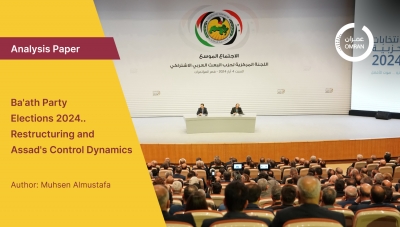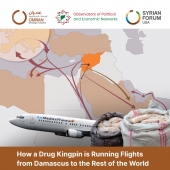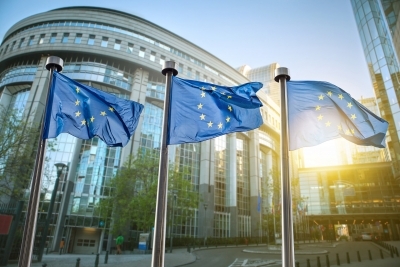Executive Summary
- The Ba'ath Party elections on May 4, 2024, during the General Conference, were part of Assad's efforts to reshape and reorganize the power centers within the Ba'ath Party to align with the regime's requirements and challenges. These elections came after years of implementing new Internal Regulations, modifying the mechanism for selecting the party's candidates in the 2020 legislative elections, and establishing an election committee in preparation for the conference.
- The number seats on the Central Committee increased to 125 from 80, with General Secretary Bashar al-Assad appointing 45 members. The members invited by Assad competed against those elected from the branches. As a result, only 49 members from the branches gained seats on the Central Committee, compared to 18 invited members and 13 members from the Ba'ath Party bloc in Parliament. Additionally, Bashar al-Assad directly appointed 45 more
- Based on a comprehensive analysis of the Central Committee members, it was determined that 22 of them served on the previous committee, 77 are employed by state institutions, and there are also members from the militaryindividuals linked to militias and security and military networks, some of whom are under sanctions.
- The provinces of Latakia, Tartus, and Homs dominated as a place of origin for Central Committee members, comprisingwere elected to the Central Committee, 11 of whom were directly appointed by Bashar Al-Assad.
- The committee included 68 Sunnis, 40 Alawites, 10 Christians, 5 Druze, and 2 Ismailis. This sectarian distribution reflects the demographic makeup of the country to some extent but also shows deviations, particularly with the significant representation of Alawites, who constitute the core of the ruling elite.
- The elections resulted in an entirely new central leadership, consisting of 14 members plus Bashar al-Assad, including 13 members who work in state institutions, among whom 3 hold high-level government positions as Minister of Defense and Prime Minister, 3 military personnel, and 3 sanctioned individuals.
- The election results generally revealed that the party leadership engaged in misleading tactics and manipulated the branch representation percentages and results, marginalizing some popular cadres at the branch level by conducting the elections as a single electoral district to create a mechanism for central control.
- The elections, its details, and the dynamics of Bashar al-Assad's intervention suggest a re-engineering of power centers within the party and the regime's philosophy regarding the form of political power (Ba'ath) and its ability to overcome stagnation and dominate the new scene, regardless of any political context.
- This restructuring indicates an effort to integrate high-ranking state officials into the party's central decision-making body, ensuring close alignment between the state's executive functions and the party's leadership.
For More: https://bit.ly/3MuUZgx






